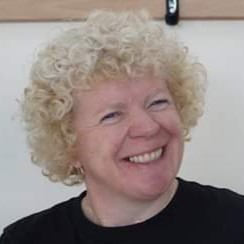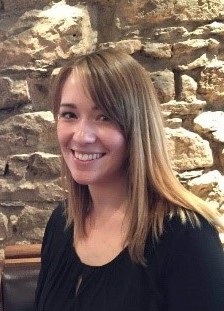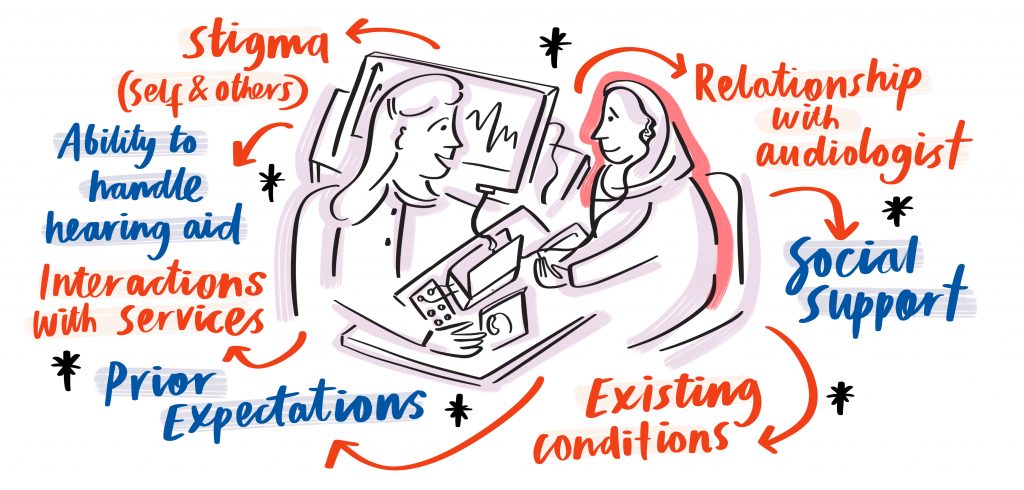March 3, 2022, by Adele Horobin
Participant to partner: a research journey

Katrina Copping

Dr Emma Broome
Katrina Copping uses hearing aids to help with her hearing loss and tinnitus. Katrina is working alongside researchers at the Nottingham Biomedical Research Centre (Hearing Theme) as a Patient Research Partner. Emma Broome is a Research Fellow at the Biomedical Research Centre. In this blog, Katrina and Emma share their reflections on Katrina’s research journey.
Participant to partner: a research journey
Katrina: I lost most of my hearing due to a virus about 10 years ago and was finally diagnosed with hearing loss three years ago; I also suffer from Tinnitus in both ears. I now wear two hearing aids. My story is probably very familiar. It took ages for me to get diagnosed after several visits to the GP to tell them I couldn’t hear and lack of understanding from all. I started on a personal journey to raise awareness and seek out any information. I decided to become an expert on hearing loss.
It was my lip-reading tutor who first mentioned joining research projects for hearing loss. At the time, I was going through the cycle of acceptance after my diagnosis, and decided that I needed to do more, and become the expert myself. I was coming through a period of very bad depression and anxiety from working in a noisy open-plan office and I felt like I needed to do something.
Emma: Katrina first became involved with the Adult Hearing Health research team in the summer of 2020. She participated in our study on auditory cognitive training (listening and thinking games). The Practice Listening and Understanding Speech (PLUS) auditory-cognitive training (ACT) was developed alongside people with hearing loss and we were at the point where we were recruiting people who have hearing aids to test it to let us know how easy it is to use. Katrina was one of the first participants we enrolled.
Since then, Katrina has joined the PLUS project Steering Group as a Patient and Public Involvement member, helping us review study protocols, participating in patient advisory focus groups and has joined us as a co-applicant on research grants. We are immensely lucky to work alongside Katrina. Her lived experience and motivation to raise awareness and improve the lives of others living with hearing loss ensures that our research is relevant and aligned to patient needs.
“A lightbulb moment”
Katrina: When I took part in the first research project with Helen and Emma, it was a lightbulb moment for me. I was excited to be involved with the research team and found I was giving something back. All of my career, I have been involved in projects that have involved partnership working. I have volunteered for over 25 years and I feel that individuals must have a sense of purpose in life. Research enables you to have the power to try and change the processes and systems. We are the experts of our own conditions, and we need to make sure we have a voice.

Barriers to hearing aid use: Illustration by Studio Straus
A sharing of power: co-producing an intervention
Emma: Hearing aids do not ‘correct’ hearing like glasses would vision. There can be many barriers to overcome when hearing aids are first prescribed such as stigma, unrealistic expectations and lack of social support. Patients, like Katrina, tell us they would benefit from additional support when first prescribed hearing aids. Our research team have been awarded a Research England Participatory Research Grant through the University of Nottingham’s Institute for Policy and Engagement.*
Katrina is currently working alongside the research team as a Patient Research Partner. This means that she has shared responsibility throughout the lifecycle of the project, from initial conception to sharing the results and examining the impact of this work. We view the project as a learning opportunity to increase the knowledge, skills, and confidence of everyone involved. We are evaluating our approach to working alongside each other and will use this experience to develop a strategy for co-working with patients and the public in our future research.
Katrina: The whole hearing loss experience is very understated. I wanted to air my views and get more people educated. I struggled to gain any support or information when I was first diagnosed and had to do all the research myself to gain a better life. This shouldn’t be the case and I feel that people with hearing loss are often lacking with the provision and advancement of other disabilities. The tool we are developing in our co-production project is a much-needed resource that should help hearing aid users to access their hearing aid to the best of their abilities. This tool could achieve not only great results but in the future result in better use of NHS resources. Together we can help people who have hearing aids receive the support they need to be active in their communities.
“My little part in the cog”
Katrina: We must engage in research and raise awareness to show how hearing loss can affect people’s lives. Being involved as a research participant made me feel valued and I wanted to start to change the world for people with hearing loss. I am passionate about raising awareness and research into hearing loss. Becoming a Patient Research Partner was my little part in the cog, which makes me feel useful. I am thrilled to be involved in the co-design of this very exciting project. I would welcome you to register your interest to come along and share your views on how we can make sure this project is a huge success.
Emma: As part of our co-production work, we will be holding workshops with people who have hearing aids, and people they communicate with. These workshops are an opportunity to help develop and refine content for a tool to support patients when they are first prescribed a hearing aid.
To register your interest in the study, please contact Sian Calvert: sian.calvert@nottingham.ac.uk.
*The Institute of Policy and Engagement, at the University of Nottingham, ensures our research and academics are at the forefront of shaping public policy and debate, ultimately improving outcomes for all. https://www.nottingham.ac.uk/policy-and-engagement/home.aspx
No comments yet, fill out a comment to be the first

Leave a Reply